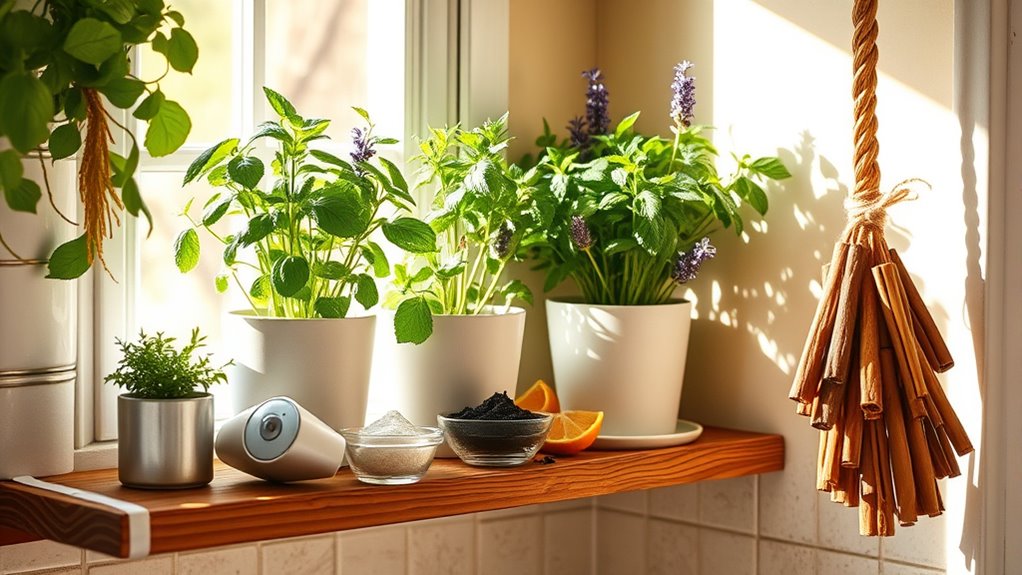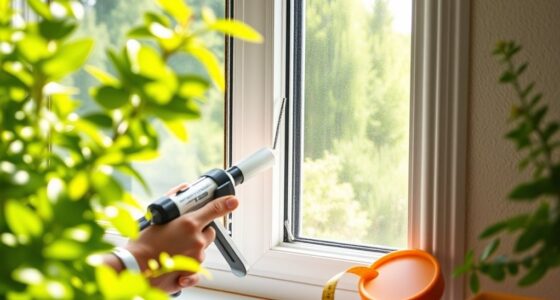To naturally combat indoor odors, use air purifiers with activated carbon filters to remove smells and pollutants effectively. Incorporate essential oil diffusers with fresh scents like citrus or mint to mask odors and target bacteria source. Place natural odor absorbers such as baking soda or charcoal in key spots to trap smells. Regularly ventilate your space by opening windows and enhance cleaning routines with essential oils like tea tree or lemon. Explore these simple tips for a fresher, healthier home.
Key Takeaways
- Use air purifiers with activated carbon filters to naturally absorb and eliminate indoor odors and airborne pollutants.
- Diffuse essential oil blends like peppermint and orange to mask odors and inhibit odor-causing bacteria.
- Place baking soda or activated charcoal in open bowls or sprinkle on surfaces to trap and neutralize smells.
- Incorporate essential oils into homemade cleaning solutions and sprays for antimicrobial odor control.
- Improve ventilation by regularly opening windows and doors to circulate fresh air and reduce indoor odors.

Indoor odors can quickly become unpleasant, but you don’t have to rely on chemical air fresheners to freshen your space. Instead, consider natural solutions that actually work and promote a healthier environment. One effective method is using an air purifier with the right filters. Not only do air purifier benefits include removing airborne pollutants and allergens, but they also help eliminate lingering odors. When choosing an air purifier, look for models with activated carbon filters, as they are particularly good at absorbing smells from cooking, pets, or musty basements. Regular use of an air purifier can considerably improve indoor air quality and keep your home smelling fresh without adding synthetic fragrances.
Using air purifiers with activated carbon filters effectively eliminates indoor odors naturally and promotes healthier air quality.
Another powerful natural option is incorporating essential oil blends into your cleaning routine or diffusing them throughout your home. Essential oils like tea tree, eucalyptus, lemon, and lavender are known for their antimicrobial properties and pleasant aromas. Diffusing these oils creates a fresh, inviting atmosphere while also tackling the source of odor-causing bacteria and mold. You can make your own blends tailored to your scent preferences, combining oils like peppermint and orange for a zesty, uplifting aroma. Using essential oil diffusers is simple, and the continuous release of natural scents can help mask and neutralize stubborn odors more effectively than chemical sprays.
In addition to diffusing oils, you can add a few drops of essential oils to homemade cleaning solutions or sprinkle them onto natural odor absorbers like baking soda or activated charcoal. These substances are excellent at trapping and neutralizing smells, especially when left out in open bowls or sprinkled on carpets and upholstery. Combining baking soda with essential oils and letting it sit overnight before vacuuming can dramatically reduce odors from pets, cooking, or smoke. Natural odor absorption methods are highly effective and environmentally friendly.
Finally, proper ventilation is essential in maintaining fresh indoor air. Regularly opening windows and doors allows fresh air to circulate, pushing out stale odors and bringing in clean air. Pairing good ventilation with an air purifier, essential oil blends, and natural odor absorbers gives you an all-encompassing approach to odor control. These methods are safe, cost-effective, and free from harmful chemicals, making them ideal for anyone seeking a healthier living space. With consistent effort, you can enjoy a home that smells fresh and inviting—without relying on artificial air fresheners that often mask odors or introduce unwanted chemicals.
Frequently Asked Questions
Can Indoor Plants Completely Eliminate Household Odors?
Indoor plants can help with air purification and odor absorption, but they won’t completely eliminate household odors. You might notice a fresher smell, yet persistent or strong odors often require additional measures. Keep in mind that plants work best when combined with good ventilation and cleaning. While they contribute to a healthier environment, relying solely on indoor plants won’t fully eradicate all household odors.
Are There Any DIY Air Purifiers That Work Effectively?
You’re wondering if DIY air purifiers can work effectively. Yes, they can! Building your own with activated charcoal is a great option because it naturally absorbs odors and pollutants. Simply place activated charcoal in a breathable bag or container and position it in problem areas. This simple DIY air purifier helps improve air quality without costly equipment, making it an efficient and natural solution for freshening up your indoor space.
How Often Should I Clean or Replace Natural Odor Absorbers?
Think of your natural odor absorbers as loyal garden tools that need regular tending. To keep them performing at their best, you should follow a strict, ideal cleaning schedule—usually every few weeks—and opt for frequent replacement when they become saturated or worn out. This way, you guarantee they continue to soak up unwanted odors effectively, keeping your indoor air fresh and inviting without letting stubborn smells take root.
Do Natural Remedies Pose Any Health Risks?
You might wonder if natural remedies pose health risks. Generally, they’re safer than chemical cleaners, but you should consider chemical safety and allergy concerns. Some natural ingredients, like essential oils, can trigger allergies or skin irritation. Always test a small area first, and avoid overuse. If you have allergies or respiratory issues, consult a healthcare professional before trying new remedies to guarantee they’re safe for your environment.
Are There Specific Scents That Help Mask Indoor Odors?
Think of essential oils as your secret weapon in scent masking, like a modern-day alchemist. Certain scents, such as citrus, lavender, and eucalyptus, are especially effective at covering indoor odors. They don’t just mask smell; they also add a fresh, inviting aroma to your space. By diffusing these essential oils, you create a natural barrier against unwanted odors, transforming your home into a more pleasant and welcoming environment.
Conclusion
Think of your home as a garden; without care, unwanted odors can take over like weeds. But by using natural remedies like baking soda, activated charcoal, or essential oils, you’re tending to your indoor space, allowing new fragrances to flourish. These simple, eco-friendly solutions act like a gentle breeze, clearing out the stale air and revitalizing your environment. Keep nurturing your home with these natural tricks, and enjoy a breath of fresh, clean air every day.









